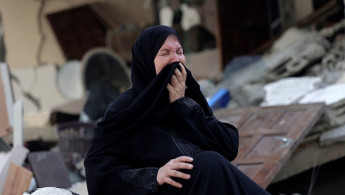Keep calm and carry on: Gazans vow to rebuild their lives after Israel's brutal war leaves dozens dead and injured
Gaza is licking its wounds and trying to restore a semblance of normality, hours after a ceasefire was reached between Israel and the Palestinian Islamic Jihad (PIJ) following a three-day conflict that saw at least 44 Palestinians killed and over a hundred injured, mostly civilians.
Residents of the besieged coastal enclave who spoke to The New Arab stressed the need to get on with the task of rebuilding their lives following the indiscriminate bombardment by the Israeli army.
"It is not easy for us to return to our life quickly, with dozens of casualties in Gaza, but this is life and it will not stop," Omar al-Ghifary, a 35-year-old father of two and supermarket worker in Gaza, told The New Arab, as he started receiving his first customers since the three-day shut down of his shop amid Israeli strikes on the strip.
“All of us (Gazans) are mourning the casualties and their families subjected to the Israeli massacres,” he added. “But we have to carry on to prove to the Israeli occupation that we love life and we will rebuild our life, not only the buildings but also our mental health.”
Since the early morning, all government and private institutions across Gaza opened their doors to the public. Supermarkets, shops, and transportation links have also restored operations in the area.
On Friday, Israel launched a military assault on the PIJ and assassinated its commander Tayseer al-Jaabari and three of his assistants, days after detaining a PIJ leader in the West Bank, unilaterally escalating tensions without justification.
The Israeli army then carried out dozens of raids against residential buildings, military sites, and civilian properties under the pretext that they belonged to the Islamist group, the second most powerful armed Palestinian group in the Strip.
On Sunday night, Israel and Islamic Jihad militants agreed a precarious Egyptian-brokered truce with hopes of ending three days of intense bombing in the besieged Gaza Strip that has left at least 44 Palestinians dead, including 15 children.
The truce, which officially started at 11:30 pm (2030 GMT), aims to stop the worst bombings in Gaza since an 11-day Israeli aerial assault last year devastated the Palestinian coastal territory.
Earlier in the day, the Israeli authorities announced that they opened Erez, the main Gaza crossing for the movement of individuals in the north of the Strip, and Kerem Shalom for goods from and into the Strip.
Speaking to The New Arab, Bassam Ghaben, director of the Kerem Shalom crossing, said “dozens of trucks carrying food, humanitarian aids, as well as fuel for the only power electricity plant have entered Gaza through the crossing.”
“Entering the synthetic fuel into the power plant will reflect positively on the plant's work in light of the large energy deficit,” Mohammed Thabet, an official at Gaza electricity company, told The New Arab.
He noted that the coastal enclave is already suffering from a decrease in the quantities of electricity needed to meet the needs of the population and facilities in Gaza.
He called on the international community to put pressure on Israel to separate security and political issues from humanitarian affairs and the daily life of the population.
The Israeli authorities also opened the Beit Hanoun crossing, allowing Gazan patients, and foreigners to move through the crossing, according to the Palestinian Authority-led Ministry of Civil Affairs.
Ghassan Alyan, the Israeli government coordinator in the Palestinian territories, said in a press statement that the reopening of the crossings with the Gaza Strip came in a "humanitarian" formula only based on an assessment and security of the situation.
“None of the residents counted on surviving [this war], especially as the Israeli occupation does not differentiate between militants and civilians," Lubna al-Harazin, another Gaza-based resident, told The New Arab.
When Gaza was under attack, the 26-year-old mother of three added, “I prayed a lot for my community to not be subjected to more massacres...our enemy deliberately kills as many children, women and elderly people as possible to force the resistance to accept their conditions".





 Follow the Middle East's top stories in English at The New Arab on Google News
Follow the Middle East's top stories in English at The New Arab on Google News


